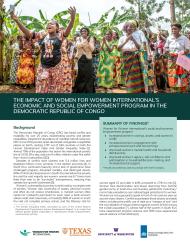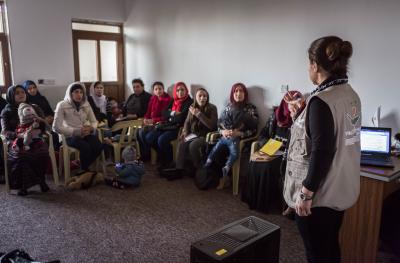
Impact Evaluation in the Democratic Republic of Congo
Impact Evaluation of Women for Women International’s Economic and Social Empowerment Program in the Democratic Republic of Congo

Women for Women International has been implementing the Stronger Women, Stronger Nations Program in North and South Kivu provinces in the Democratic Republic of Congo (DRC) since 2004. In collaboration with researchers at the University of Washington, University of Texas at Austin, Women for Women International conducted a 24-month randomized control trial (RCT) in four communities in South Kivu, DRC from 2017 to 2019. The study measured the impacts of the 12-month social and economic empowerment program on women’s livelihoods, savings and assets, social empowerment, well-being, and social assets a year after program completion. Researchers also examined the potential additional impact on women participants of having a male household member join a concurrent Men’s Engagement Program (MEP).
The research showed that women’s participation in the Signature Program led to significant gains in gross earnings, use of savings and average amount of savings, access to credit, and assets, one year after program completion. Compared to women in the control group, graduates of the program increased participation in household decision-making, reported higher feelings of control of their lives, diversified household diets, had lower rates of anxiety, and increased social inclusion and support networks.
The research also highlighted areas for improvement: Women’s overall attitudes about gender norms and women’s reported experiences of intimate partner violence did not change during this study period. Having a spouse or male household member in MEP also did not lead to additional gains for women in key outcome areas. We understand that attitudes and behaviors around gender norms take time and targeted efforts to change. The results demonstrate a need for larger and longer investments, especially at the community level, to cultivate an environment where all women use their power and reach their full potential.
This impact evaluation demonstrates that Women for Women International’s combined focus on poverty alleviation and gender transformation in its approach leads to gains across economic and social empowerment domains for women. Our bundled approach can help women improve their lives despite conflict, poverty and gender discrimination. With a stronger foundation for confidence, self-sufficiency and financial stability, women made changes based on their vision for their own power, their families and their communities.
Read the published research paper or research brief for more information and results.
Watch the webinar presentation of findings, reflections, and recommendations
Watch our discussion about the findings
Additional resources
- Presentation of results of randomized-controlled trial of Women for Women International’s Signature Program in the DRC (September 2020). Available in French.
- Women for Women International – DRC RCT - Summary of Results. Download here.
- Women for Women International – DRC RCT: Baseline results brief. Download here.
- Women for Women International – DRC RCT One-page project summary. Download here.
- WEBINAR SLIDES: Women for Women International’s Economic & Social Empowerment Program in the Democratic Republic of the Congo: Impact Evaluation Results & Next Steps. Download here.
- Working Paper: Graduation Programs Targeting Women: Evidence from the Democratic Republic of Congo. Download here.
- Published Research Paper: Multifaceted Programs Targeting Women In Fragile Settings: Evidence from the Democratic Republic of Congo. Download here.
For additional information about this research, please contact research@womenforwomen.org
Acknowledgements
This intervention trial was a collaborative project of Women for Women International, Dr. Rachel Heath, University of Washington, and Dr. Manuela Angelucci, University of Texas at Austin. The research team would like to thank the participants of this study for sharing their time and experiences, the Women for Women International program implementation staff and the data collection teams, Marakuja Kivu Research and Innovative Hub for Research in Africa (IHfRA). This research was funded by the Ministry of Foreign Affairs of the Netherlands and BlackRock. The funds were managed by Women for Women International.
The views expressed in the linked documents are solely those of the authors and do not necessarily reflect the official views of the Ministry of Foreign Affairs of the Netherlands, BlackRock, University of Washington, or University of Texas at Austin.
